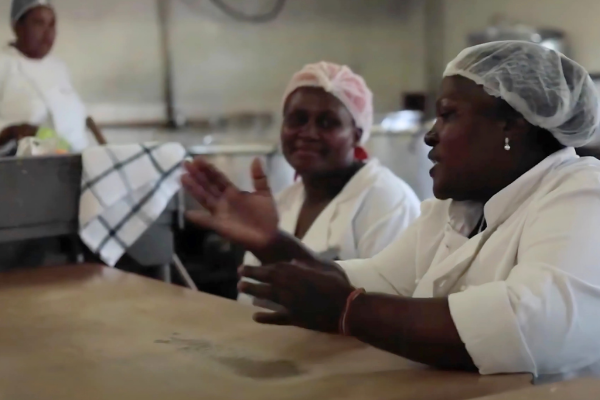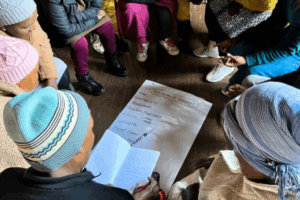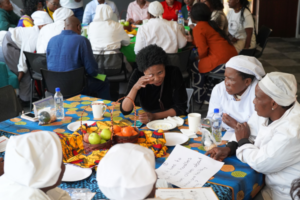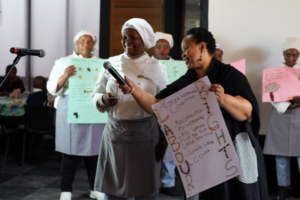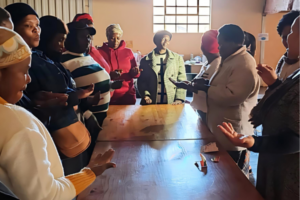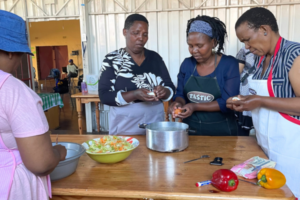Volunteer Food Handlers struggle to access UIF benefits at the end of their two-year contracts working under the National School Nutrition Programme (NSNP). Despite contributing to the Unemployment Insurance Fund, they face delays, misinformation, and a lack of support. The NSNP, implemented by the Department of Basic Education, is among the social sector programmes of the Expanded Public Works Programme that rely on women’s labour.
This article is the fourth in a series on our campaign with a group of former and current Volunteer Food Handlers in Gauteng for adequate access to UIF benefits. Read the articles here (UIF framework), here (UIF claiming process), here (role play as a feminist popular education tool in UIF campaign by food handlers), and here (dignity, labour and access to UIF).
With the day usually beginning at five in the morning —earlier for some — the day of the food handler begins.
Alarm clocks ringing.
Water boiling.
Breakfast cooking.
Children waking.
Birds chirping.
The sun rising.
These are the repetitive sounds of a typical morning. Almost mechanical, almost robotic. They prepare the children for school — combing hair, packing lunches, checking schoolbags, ensuring breakfast is eaten. Then, they clean up the mess left behind, making sure the house is ready for the evening routine. But we’ll get there.
There is hardly any time for themselves. Still, as if by muscle memory, they move quickly to get ready for work. By six o’clock, they are out the door and on their way to begin another shift — this time in the school kitchen. A thankless job.
They arrive before the children. Before the noise. Before the mess.
Water is collected.
Vegetables are peeled.
Meat is spiced.
Porridge is stirred.
The routine continues.
The children begin to arrive, and many greet the women in the kitchen, already anticipating the warmth of their first meal. But long before that meal reaches the plate, these women have already been working—at home, in transit, and now at school. This is the double burden: the seamless, often invisible overlap of domestic and public care work performed primarily by Black working-class women.
In this context, the double burden refers to the compounding and overlapping forms of labour—both visible and invisible—that these women are expected to perform. At school, they are tasked with cooking, cleaning, and nurturing, often under temporary, low-wage, and precarious conditions. At home, the unpaid work continues: caregiving, cleaning, emotional labour, and more. These burdens are not only physical. They are emotional, psychological, and political.
This structure is rooted in the historical legacies of racialised and gendered labour—where Black women have been positioned to care for everyone else, while their own needs, rights, and dignity are consistently ignored.
The food handler is more than a worker. She is a metaphor. A stand-in for all precarious and undervalued workers across this country—those whose labour is essential, yet unseen. In policy, their presence is often ignored. Labour protections remain ambiguous or entirely absent: no guaranteed working hours, no leave days, no formal reporting structures. Their rights are as undefined as their roles.
And this invisibility spreads.
It follows them to the shops, where they’re spoken over.
To community meetings, where their concerns are brushed aside.
To government offices, where their voices are treated as noise.
It corrodes confidence. It shrinks voice. It renders their existence peripheral.
This invisibility is a form of violence.
We see it in the traumatic red tape of the UIF claiming process — women sent from school to the department and back again, stalled by unclear documentation and shifting expectations. Many of them cannot afford the repeated trips. They operate from a deficit, and the system seems to count on that. It wears them down. It strips them of the energy to keep asserting themselves.
This isn’t inefficiency. It is systemic design. A punishment for daring to ask for what is due. A modern echo of an old refrain: Black women are nothing, and therefore deserve nothing.
But their labour continues to be the backbone of this society.
And still, they rise.
They gather in circles of care, finding strength in each other. They speak, share, organise, and hold space in ways that defy the silencing around them. Their labour may be undervalued, but their dignity is undeniable.
At the end of the school work day, they get home — after leaving the kitchens spotless and having stood the whole day. They get home, wash their children’s school clothes, assist with homework, prepare dinner, wash dishes after dinner, prepare children, themselves — and others, elders — for bed. Sleep. Silence. The next morning, the routine continues.
The challenge now is not theirs. It is ours. It is on the state. It is on the institutions. It is on all of us to refuse a world where dignity depends on your job title or the uniform you wear.
Because a country’s children that eats because of them must also stand up for them.
________
A day in the life of a Volunteer Food Handler
Khuli Gumede is one of thousands of women who are the ‘hands’ and ‘heart’ of the National School Nutrition Programme. Their care work sustains the NSNP, yet they remain invisible, unrecognised and underpaid.

